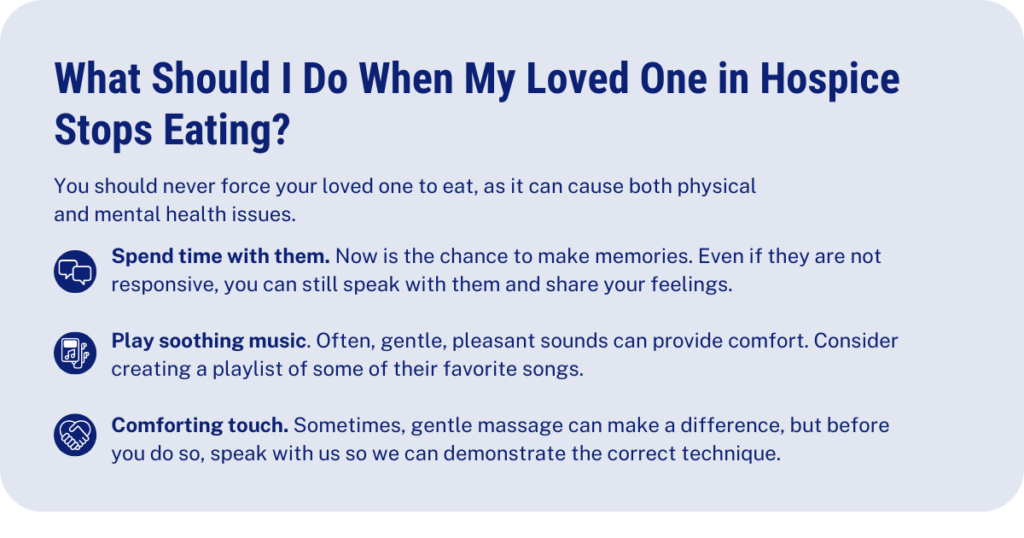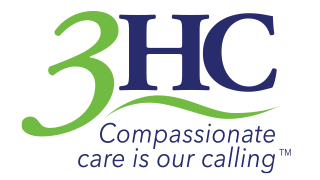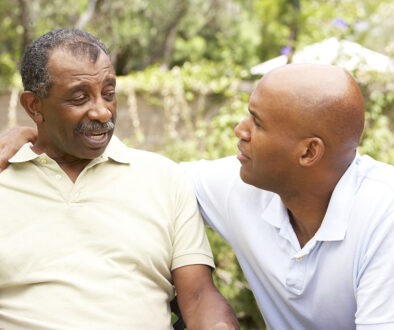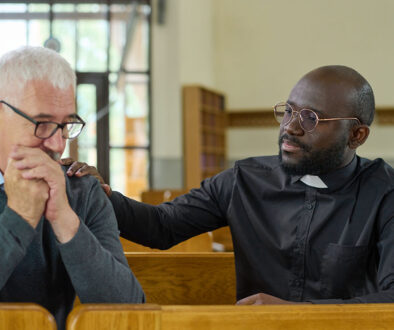What Does It Mean When a Hospice Patient is Not Eating?
We know it can be troubling and concerning. When your loved one is not eating, you may wonder why and how it affects their overall condition. In actuality, a hospice patient not eating is a natural part of the process as they near the end of their journey.
Of course, knowing that doesn’t necessarily make it any easier.
“We know it can be upsetting to watch your loved one stop eating and drinking, and we get a lot of questions about this,” said Blaire Dawson, RN BSN, clinical director of Home Hospice. “We respect and acknowledge your concern, and we want you to know that during this time, we are still providing comfort care. We consider you and your loved one a part of our 3HC family, and we want you to ask any questions you have about this period in your loved one’s life.”
We’ll take a closer look at how a hospice patient not eating is a natural part of the dying process, how you can help your loved one and how to take advantage of our grief counseling services.
Why Do End-of-Life Patients Stop Eating?
At this stage, hospice patients typically aren’t hungry or thirsty.
What Does It Mean When a Hospice Patient Is Not Eating?
This loss of appetite is a natural part of this end-of-life journey, and it typically means that your loved one is in the final stages. During this stage, the digestive system shuts down because the body is trying to conserve energy.
Our Approach When a Hospice Patient is Not Eating
We don’t force food, nor do we insist that your loved one eat and drink. Doing so can actually cause a lot of anxiety and make them uncomfortable.
Forcing your loved one to drink can lead to additional health issues such as edema because their body has lost the ability to regulate and process fluids. Likewise, compelling them to eat can cause them to choke and create the possibility that food may get into their lungs.
Our policy is to continue to provide comfort care, ensuring that these final moments with your loved one are special and sacred.
How Long Before Death Does Appetite Decrease?
Usually, this occurs within a few weeks of death. We want to emphasize that during this time, your loved one is not hungry or thirsty, and therefore loses interest in eating and drinking.
How Long Can a Hospice Patient Go Without Eating?
We treat every patient with individualized care because we recognize and honor them as an individual. Therefore, it’s difficult to pinpoint an exact time frame for how long your loved one can go without eating.
However, in general, a patient can go for as little as a few days or as long as a few weeks without eating.
Why Do End-of-Life Patients Stop Eating?
During the final stages of life, your loved one’s body needs less energy because their organs are slowly shutting down. This makes it difficult to process food.
In addition, they may be too weak to swallow food and water, so it’s not appropriate to try to force them. They could also be so sleepy that feeding would be difficult–and as we mentioned earlier–can contribute to even more health issues.
What Can I Do When My Loved One Stops Eating?
We’ve helped many families during these difficult times, and the following are some things that we’ve found provide comfort to both the patient and the ones they love.

Remember that it is also important to take care of yourself during these challenging moments. While 3HC is not a religious organization, we have found that many families take comfort in talking to someone about spiritual issues. One of our hospice chaplains is always available to speak with you.
3HC Hospice Cares For Your Family As If They Were Our Own
It can be disturbing when your loved one won’t eat and drink, but we want to assure you that this is the natural part of the dying process. It’s during this time that we will continue to offer comfort care not just for your loved one, but for your whole family.
We believe caring for the patient means caring for those who are dear to them. That’s why we offer grief counseling and even special camps to help children and youth process their grief.
For decades, we’ve proudly served families from the Triangle to the NC Coast. If you’re wondering if your loved one can benefit from hospice care, we invite you to contact us.





